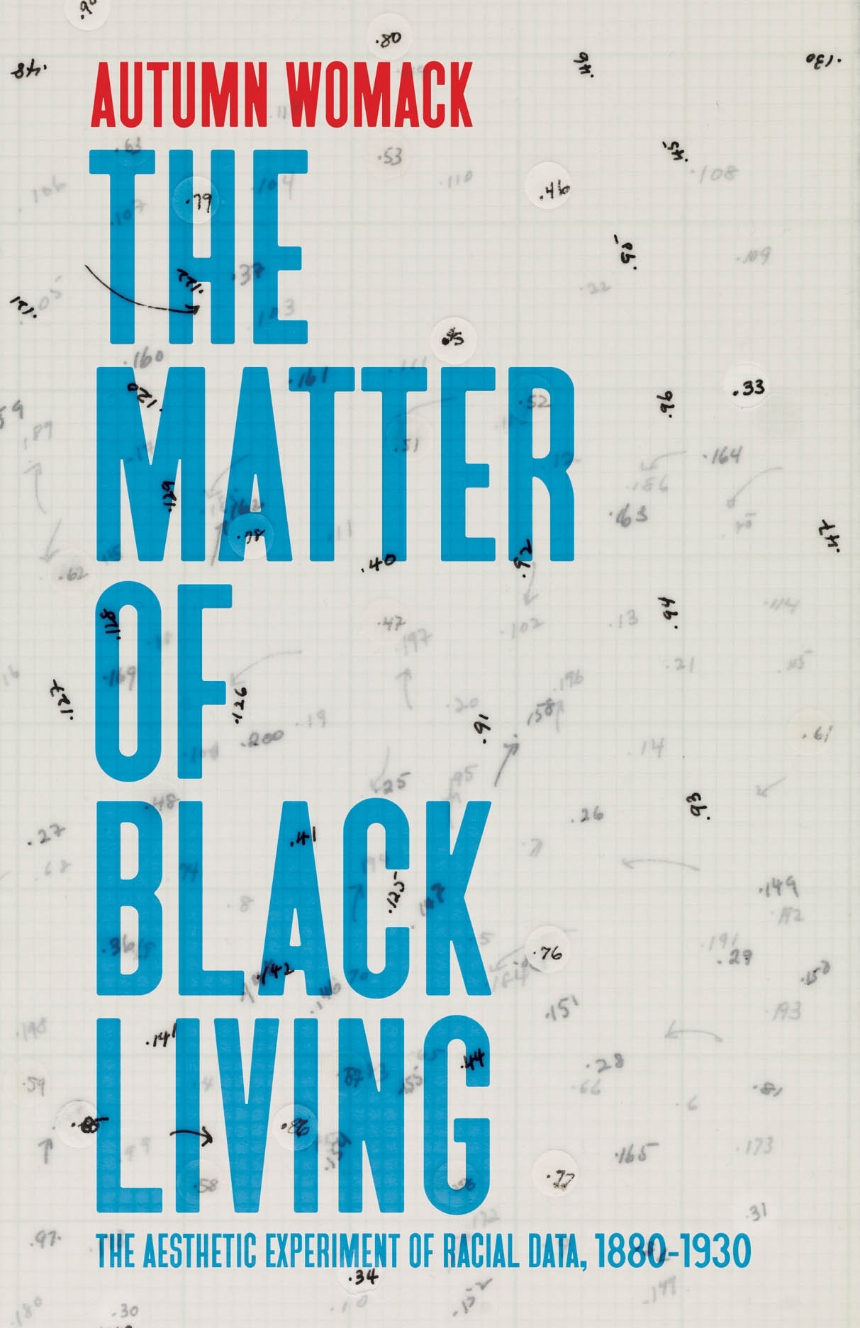The Matter of Black Living
The Aesthetic Experiment of Racial Data, 1880–1930
9780226806914
9780226806747
9780226806884
The Matter of Black Living
The Aesthetic Experiment of Racial Data, 1880–1930
Examining how turn-of-the-century Black cultural producers’ experiments with new technologies of racial data produced experimental aesthetics.
As the nineteenth century came to a close and questions concerning the future of African American life reached a fever pitch, many social scientists and reformers approached post-emancipation Black life as an empirical problem that could be systematically solved with the help of new technologies like the social survey, photography, and film. What ensued was nothing other than a “racial data revolution,” one which rendered African American life an inanimate object of inquiry in the name of social order and racial regulation. At the very same time, African American cultural producers and intellectuals such as W. E. B. Du Bois, Kelly Miller, Sutton Griggs, and Zora Neale Hurston staged their own kind of revolution, un-disciplining racial data in ways that captured the dynamism of Black social life.
The Matter of Black Living excavates the dynamic interplay between racial data and Black aesthetic production that shaped late nineteenth-century social, cultural, and literary atmosphere. Through assembling previously overlooked archives and seemingly familiar texts, Womack shows how these artists and writers recalibrated the relationship between data and Black life. The result is a fresh and nuanced take on the history of documenting Blackness. The Matter of Black Living charts a new genealogy from which we can rethink the political and aesthetic work of racial data, a task that has never been more urgent.
As the nineteenth century came to a close and questions concerning the future of African American life reached a fever pitch, many social scientists and reformers approached post-emancipation Black life as an empirical problem that could be systematically solved with the help of new technologies like the social survey, photography, and film. What ensued was nothing other than a “racial data revolution,” one which rendered African American life an inanimate object of inquiry in the name of social order and racial regulation. At the very same time, African American cultural producers and intellectuals such as W. E. B. Du Bois, Kelly Miller, Sutton Griggs, and Zora Neale Hurston staged their own kind of revolution, un-disciplining racial data in ways that captured the dynamism of Black social life.
The Matter of Black Living excavates the dynamic interplay between racial data and Black aesthetic production that shaped late nineteenth-century social, cultural, and literary atmosphere. Through assembling previously overlooked archives and seemingly familiar texts, Womack shows how these artists and writers recalibrated the relationship between data and Black life. The result is a fresh and nuanced take on the history of documenting Blackness. The Matter of Black Living charts a new genealogy from which we can rethink the political and aesthetic work of racial data, a task that has never been more urgent.
288 pages | 7 color plates, 18 halftones | 5 1/2 x 8 1/2 | © 2021
History: American History
Literature and Literary Criticism: American and Canadian Literature
Reviews
Table of Contents
Introduction: Data and the Matter of Black Life
Acknowledgments
Notes
Index
Undisciplining Data
The Social Life of Racial Data
Racial Data, Visual Revolutions
The Aesthetics of Data
Undisciplining as Method
Overview
1. The Social Survey: The Survey Spirit The Social Life of Racial Data
Racial Data, Visual Revolutions
The Aesthetics of Data
Undisciplining as Method
Overview
“The Survey Spirit”: Origins, Evolution, and the Radical Operations of the Social Survey
“Ugly Facts” and (Anti)Social Data: Kelly Miller, the American Negro Academy, and the Call for the Social Survey
A Book to Do Some Good: Kelly Miller, Sutton Griggs, and the Emergence of Social Document Fiction
Faulty Surfaces, Unruly Eyes
Everywhere and Nowhere: The Social Survey’s Nongeography
2. Photography: Looking Out “Ugly Facts” and (Anti)Social Data: Kelly Miller, the American Negro Academy, and the Call for the Social Survey
A Book to Do Some Good: Kelly Miller, Sutton Griggs, and the Emergence of Social Document Fiction
Faulty Surfaces, Unruly Eyes
Everywhere and Nowhere: The Social Survey’s Nongeography
Seeing Survival
Deep Black Mourning: Lynching’s (Anti)Photographic Logic
“Let Them See”: Photography, Performance, and Reform
Looking Out: Toward a New Visual Epistemology of Survival
Photographically Hesitant: The Visual Politics of W. E. B. Du Bois’s “Jesus Christ in Georgia”
3. Film: Overexposure Deep Black Mourning: Lynching’s (Anti)Photographic Logic
“Let Them See”: Photography, Performance, and Reform
Looking Out: Toward a New Visual Epistemology of Survival
Photographically Hesitant: The Visual Politics of W. E. B. Du Bois’s “Jesus Christ in Georgia”
Beyond the Frame: Overexposure and Zora Hurston’s Filmic Practice
“Drenched in Light”
Recording Racial Feeling
Contraband Flesh
Cinematics of Negro Expression
Coda: Racial Data’s Afterlives“Drenched in Light”
Recording Racial Feeling
Contraband Flesh
Cinematics of Negro Expression
Acknowledgments
Notes
Index
Awards
MLA: MLA William Sanders Scarborough Prize
Won
Modernist Studies Association: Modernist Studies Association--First Book Prize
Shortlist
